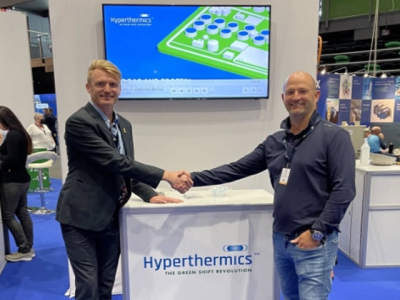Recycling waste from the worlds largest closed-containment salmon farm

American Aquafarms, which plans to build a 36,000 tonne capacity closed containment salmon farm off the coast of Maine, has signed an agreement with Hyperthermics to transform fish waste into energy and fertiliser.
Mikael Rones, CEO of Atlantic Aquafarms (right) and Stig Amdam, sales manager at Hyperthermics, signed the agreement
The farm aims to be completely emission-free, and is designed so that all the waste can be captured, separated in treatment plants on the sides of the pens and transported by barges to land. Hyperthermics` technology will then transform the waste, together with additional waste from American Aquafarms’ land-based smolt production plant.
As American Aquafarms CEO, Mikael Rønes, explains: “As we aim to produce the most sustainable salmon at sea, utilising the sludge from pens is crucial. Along with emission-free farming at sea, transforming the sludge into renewable energy contributes to more sustainable activities in our smolt production and the processing plant on land. American Aquafarms is now working on the approvals needed to be able to realise the project.”
“We have had good discussions with American Aquafarms over time,” added Stig Amdam, sales manager at Hyperthermics AS. “I am very impressed by their vision for sustainable salmon farming, along with their interest in our technology. We believe that it will be an essential contribution to greener aquaculture. For us, this agreement is important. The aquaculture industry is taking big steps in the green direction in more and more countries, and the project will be a prominent showcase for us in a new continent.”
Related news
 Vietnam’s shrimp export rises slightly in 9 months
Vietnam’s shrimp export rises slightly in 9 months Vietnam’s shrimp export turnover hit 2.8 billion USD in the first nine months of 2021, up 2.7 percent year-on-year
 Shortage of raw materials in fishery processing factories
Shortage of raw materials in fishery processing factories The demand for raw materials for the domestic market and export processing increased sharply at the end of the year, so fishermen persisted in clinging
 A breath of fresh air - how nanobubbles can make aquaculture more sustainable
A breath of fresh air - how nanobubbles can make aquaculture more sustainable Devices that produce nanobubbles are becoming increasingly popular in a range of aquaculture operations, with a growing number of studies supporting their value